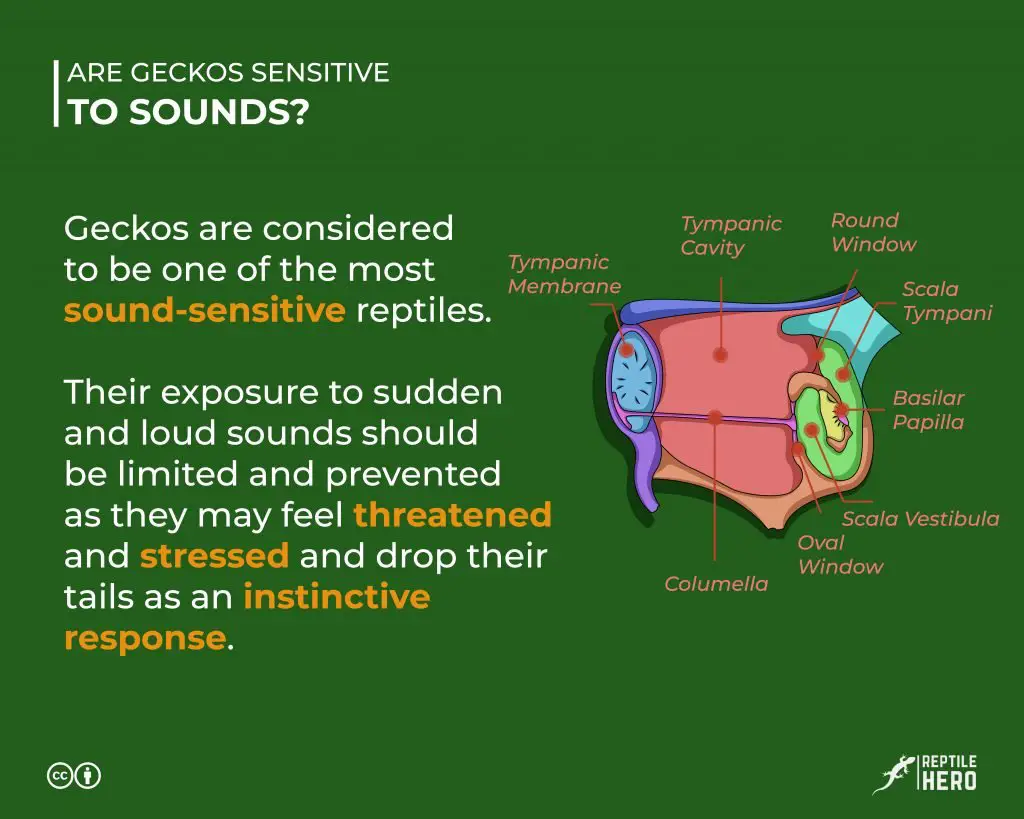Are Geckos Sensitive To Sound? [4 Reasons, 9 Signs, 7 Tips]
Before I got my first ever gecko, I thought they were deaf like snakes because that’s what a lot of people online were saying (turns out that’s a myth). Moreover, after talking to many other keepers, I was receiving a lot of differing information and opinions on the topic – so what’s the actual deal with sound sensitivity in geckos?
Geckos are sensitive to sounds. Despite not having external ears, they are considered to be one of the most sound-sensitive reptiles. Their exposure to sudden and loud sounds should be limited and prevented as they may feel threatened and stressed and drop their tails as an instinctive response.
You heard that right – geckos have pretty sensitive ears but that’s not all there is to it!

The Truth Behind Gecko Ears & Sound Sensitivity
Geckos are one of the most fascinating pets you could ever have – at least in my humble opinion they are. I find that their ears are particularly interesting but I didn’t really know much about them during my first few months of keeping a gecko. Seeing how different their ears are to ours got me really curious though. After years of gecko-keeping experience, I’m going to share with you what I’ve found out from talking to experts and reading up tons on the topic.
The Anatomy of Gecko Ears & How They Hear
Unlike us humans and many other mammals, our little gecko friends don’t have visible external ear flaps of skin called the pinna. But this does not mean that they cannot hear things. As a matter of fact, geckos are known to have some of the most highly developed ears among reptiles [1].
Instead, they have ear holes behind their mouths on either side of their heads which are connected to each other through a cavity and are protected by a double layer of thin clear film. Some species have this more hidden in a very shallow ear canal. You could actually see straight through the ear of geckos and many other lizards like this:
More specifically, this transparent protective double-film is made of a thin layer of skin that lies on top of another thin layer of tissue called the tympanic membrane. The tympanic membrane of geckos works the same way our eardrums do; they act as receivers for sound waves and enable us to pick up the noisy world around us.
Both middle ears sit between their tympanic membrane on one side, and the Eustachian tube and the pharynx on the other. Inside that cavity, you could also see a column made of a small bone, the stapes, and cartilage, the extrastapes. This facilitates hearing – when the membrane vibrates, the column relays the sound waves into the inner ear for processing. Near them is a muscle named the stapedius that can dampen strong vibrations caused by loud and high-pitched sounds if needed [2].
Their inner ear houses organs that are responsible for balance and hearing. The cochlear duct, in particular, contains all their sensory hair cells which ultimately passes on auditory information to their auditory nerves.
However, geckos don’t only pick up sounds through airborne vibrations. Geckos also pick up ground-borne vibrations through a small bone in their skulls referred to as the quadrate which is near the inner workings of their ears [3].
The Science of Sound Sensitivity in Geckos

Geckos are sensitive to sounds within the 100 to 10,000 Hz range with an intensity threshold of up to 50 dB. Although their hearing sensitivity is considered less than those of humans in terms of frequency range and volume threshold, some geckos can hear ultrasonic sounds which humans can’t hear.
Some people used to think that geckos don’t have sensitive hearing because they don’t react as much to sounds as our other pets do. I used to think so too. You see, back then many people thought that snakes and many other reptiles were deaf because they lacked the ears that we are most familiar with. However, this is not the case.
Many scientists actually say that geckos are incredibly sound-sensitive creatures capable of hearing high-frequency sounds up to about 10 kHz [3]. They are also known to have the most number of hair cells in any reptile and the largest basilar papilla. Furthermore, the highest recorded intensity threshold for geckos is 50 dB [4].
To put this into perspective, humans have a hearing range of 20 to 20,000 Hz and a threshold of 130 dB. Just to add more context, Hz refers to pitch or frequency while dB refers to the loudness or intensity of a sound, both of which could be damaging in high levels especially during long exposure [5]. So, humans can hear a wider array of sounds.
But, one study has shown that geckos can actually hear some sounds that we can’t – sounds in the ultrasonic range [6]. This may explain why our cold-bodied babies sometimes get keyed up seemingly without any particular reason. They might’ve heard something we couldn’t.
If you want to get a picture of what frequencies sound like, I’ll be linking a video below for you to check out. Keep in mind however that playing this on full blast won’t be a fun experience, nor would it be all that safe.
Another interesting thing about hearing in geckos is that a species’s body mass and call intensity or loudness both positively correlate to their specific sound sensitivity. Bigger and louder gecko species are more sensitive to sound when compared to smaller and quieter gecko species.
4 Main Functions of Sound Sensitivity in Geckos
After years and years of existence here on Earth, geckos have developed specialized ears that help them thrive in the harsh conditions of their natural habitats. Their sensitive ears serve them many advantages. Some of which are also – unsurprisingly – closely related to why they also produce different vocalizations.
#1 – Avoiding Predators
Most of us are probably aware of the fact that the wild relatives of our pet geckos live in places that don’t necessarily ensure their safety from bigger animals that view them as valuable food sources as their availability is not necessarily certain.
For geckos to successfully avoid having to confront predators and not have the need to drop their tails at the slightest chance of escape, they have to rely heavily on their hearing.
Making use of both airborne and ground-borne sound vibrations, geckos can efficiently figure out where bigger carnivorous animals are located and which directions they may possibly take to reach them.
Once they find out these things, they can either burrow into the ground or climb up bushes and trees to conceal themselves from the hungry eyes of their predators.
#2 – Detecting Preys
Another important function of sound sensitivity in geckos relates to their ability to locate and catch their prey even when these insects are hiding in small crevices and hollowed out rotten tree trunks.
Though it’s only the second most important sense geckos use when foraging for insects out in the wild and in captivity, it undoubtedly still plays a crucial role in feeding.
As a matter of fact, geckos that have hearing impairments are a lot less likely to successfully capture their prey [7].
Geckos can experience this if they accidentally ripped through their tympanic membrane while trying to remove shed skin, experience it getting caught by branches or sharp rocks when moving around, or have it punctured through during an attack by a predator.
Besides, although some gecko species pretty much have night vision, having their highly developed ears help them to detect live feeder insects when hunting in areas with limited lighting or total darkness still goes a long way.
#3 – Finding Mates
Of course, one important reason geckos need to hear clearly is for them to look for suitable mates for the breeding season. This is especially true for our precious little soft-bodied geckos who only make short but soft mating calls.
Be it in the wild or in captivity, most geckos are known to live in relative solitude. So they need a keen sense of hearing to know if a mating partner is within their reach.
So the next time you hear your male gecko chirping at you while gently nipping at your hand during that time of the year, he’s ready to get it on with the lovely female geckos. I mean, come on, just look at this cute little crestie, he’ll definitely be popular with the ladies:
Why they do this is still beyond me and many other keepers who have witnessed it. Human hands are quite different in both size and shape from their regular breeding partners, so I still can’t wrap my head around this behavior. Still, I can’t deny the fact that it’s quite amusing to watch.
#4 – Determining Territories
Most keepers and breeders would know how territorial geckos can get – which is why most hobbyists advise people to not cohabitate geckos, even those of the opposite sex if they aren’t going to be paired up for breeding.
In the wild, of course, maintaining and protecting their territory is incredibly important for a big adult male gecko. Such a gecko will often vocalize to stake claim on the territory and warn others not to trespass unless they are willing to fight over the area.
On the flip side, a small gecko – be it due to its species or its age – would probably want to stay clear of any aggressive adults.
Smaller and more vulnerable geckos will scan their surroundings through vocalization for calls of territorial claims to avoid any unnecessary confrontation that could put them at risk of getting injured or eaten.
Yes, you read that right, I said eaten because I’ve read and heard of multiple reports of big geckos also preying on small and weak geckos especially during times of food scarcity.
Good Sounds vs Bad Sounds for Geckos

Gecko keepers, regardless if they’re new or experienced, seem to be in disagreement about whether specific sounds are bad for geckos. I’ve heard some acquaintances say that their geckos are totally unbothered by them playing music out loud and even go so far as to claim that even construction noise won’t affect them in any way.
Other keepers including most of my friends, however, would probably beg to differ as they have seen how screaming kids and sudden loud banging noises easily stress their geckos to the point where they display defensive behaviors.
Honestly, I think that no single factor can differentiate good sounds from bad ones. Instead, I think it’s dependent on 3 main criteria: 1) way of introduction, 2) level of sound intensity, and 3) level of sound frequency.
Overall, sounds that do not bother geckos are introduced gradually and of low to moderate loudness and pitch. In contrast, sudden, very loud, and high pitched sounds are bad for geckos.
Sounds that do not bother geckos are:
- Flowing water or trickling rain
- Noise insects make like the chirping of crickets
- Household appliances
- TV and radio shows
- Soft and calming or lively but mellow music like these (available on Amazon)
- Natural talking or singing voice of humans
- Rusting of leaves
- Humming or whistling
Bad sounds that can scare and bother geckos are:
- Booming thunder
- Clapping or banging
- Major renovation or construction noise
- Screaming or shouting
- Calls of their predators like the chirping of birds and any similar noise
I added the last one to bad sounds because, although such calls aren’t always loud, they still naturally stress out geckos. Even if they’ve never been in the wild, geckos raised in captivity have basically been hardwired to be vigilant of sounds possible predators make to ensure their safety.
Geckos Get Bothered by Sounds
I remember this one time when I was setting new morning alarms on my phone because my old music choice wasn’t exactly “alarming” enough to wake me. My mistake was forgetting that my phone was still on full volume before playing the music. After clicking the play button, I was greeted by incredibly loud music. I tried to turn it off as soon as I could but when I saw how my gecko reacted, I knew the damage was done – he was obviously not happy.
9 Signs Of a Gecko Bothered by Noise
Bad noise can be stressful or even harmful to geckos and this can be noticed in 9 different behaviours:
- Jumping away
- Biting you
- Tensing up
- Being skittish
- Tail waving
- Moving quickly
- Distressed vocalizing
- Tail dropping
- Not eating
In the earlier incident I mentioned, my gecko was definitely on high alert. He was all tensed up while waving his tail from side to side.
Keep in mind that these signs aren’t only applicable to bad sounds. Geckos can also be startled by the slightest sudden sounds if they have been accustomed to a quiet environment.
What’s more, is that they may also display such behaviors upon hearing ultrasonic sounds we can’t even hear. So yes, there may be times when they suddenly act out, out of nowhere. Well, at least you now know that geckos don’t just arbitrarily display abnormal behavior.
4 Steps in Dealing with a Bothered Gecko
It can be extremely overwhelming to deal with a spooked gecko that is obviously against coming anywhere near you. So, it’s understandable if you feel stressed and frustrated as well in such situations. But don’t worry, the answer isn’t really rocket science!
Just follow these 4 steps and be as calm and patient as you can be:
- Give them space. Never corner them because that would just stress them out more.
- Talk to them like you normally would but in a softer voice at a slower pace.
- Gradually get close to them and observe how they react. Don’t make abrupt movements as much as possible to not agitate them any further.
- Once they’ve calmed down and stopped behaving defensively and/or aggressively, offer up your palm for them to climb onto once they’re ready to be handled.
When handling them outside of their enclosure, make sure to keep them closer to the ground so that they can safely get away from you if they get startled again. Only get up from the floor once you’re sure that they’re totally okay and make them feel secure in their vivariums.
7 Practical Tips to Avoid Bothering Your Gecko
You guys have probably thought of some of the tips I will be listing down below. Nevertheless, I’m going to tell you numerous ways to prevent your geckos from getting spooked by bad sounds. Check them out:
- Always shut your reptile room’s door to muffle sounds coming from the outside.
- Don’t place your gecko’s vivarium in a high-traffic area in your house like the foyer or by the stairs.
- If you and your family are the musical types, designate a separate room for playing.
- Never place your gecko and their enclosure on top, below, beside, or anywhere close to a stereo or any piece of sound-producing equipment.
- Whenever using household tools and appliances, don’t turn them on right in front of geckos. Start from the farthest room first to get them used to it slowly.
- Have your music, games, shows, and movies on low to moderate volume. Never have them on full blast.
- Invest in soundproofing materials and fixtures. You can easily buy sound dampening panels, sound deadening sheets, noise-reducing curtains, and soft closing hinges or slides among other things on Amazon.
Can Geckos Go Deaf?

Hearing loss in geckos is not well understood. However, there are cases of hearing loss and impairment due to inborn defects and physical injuries.
I have only ever read or heard about very few cases of geckos going completely and permanently going deaf. Most are due to major injuries or conditions but there is very little information on either.
One keeper I used to often run into once told me about how her son’s gecko was deaf, when I asked what caused it, she told me she wasn’t sure but recalled that their exotic vet said something about it being a birth defect.
Hypothetically speaking though, I’m pretty sure geckos might rupture their tympanic membranes or damage their auditory hair cells due to sudden but prolonged exposure to extremely intense sounds in addition to the three other injuries I mentioned earlier.
Although I did say before that geckos have a small muscle in their ears capable of dampening sounds, humans also have something similar yet we still see many cases of impairment or loss of hearing. Here’s the thing though, geckos are known to have the ability to regenerate both their tympanic membrane and their auditory hair cells [8]. So they do not become permanently deaf in such cases.
Takeaways
Geckos do not have external ears but have developed highly sensitive ears. In fact, they can perceive sound waves that are airborne and ground-borne.
When gradually exposed to sounds of low to moderate loudness and pitch, geckos remain relatively calm and unbothered. On the other hand, when suddenly exposed to sounds of high loudness and pitch, geckos will get spooked.
Sources
- https://www.britannica.com/science/sound-reception/Auditory-sensitivity-of-amphibians
- https://en.wikivet.net/Lizard_Ear
- http://www.anapsid.org/reptilehearing.html
- https://www.ncbi.nlm.nih.gov/pmc/articles/PMC2933256/
- https://labor.alaska.gov/lss/pads/noise.htm
- https://journals.plos.org/plosone/article?id=10.1371/journal.pone.0146677#:~:text=gecko%20(~30%20dB%20SPL,the%20largest%20species%20in%20Gekko.
- https://www.jstor.org/stable/1564162?read-now=1&refreqid=excelsior%3Ab25d4499dcd8b1b2e085157f8a9386fa&seq=2#metadata_info_tab_contents A
- https://stanmed.stanford.edu/listening/scientists-hope-cure-hearing-loss-studying-birds.html

![9 Woods Safe For Gecko Tanks [and 16 to Avoid]](https://www.reptilehero.com/wp-content/uploads/2021/04/Wood-Avoid-Gecko-Tank-768x614.jpg)



![6 Reasons Why Geckos Make a Clicking Sound [With Science]](https://www.reptilehero.com/wp-content/uploads/2021/01/Gecko-Vocalization-768x576.png)
